Smelly Dishwasher Solutions: Say Goodbye to Unpleasant Odors
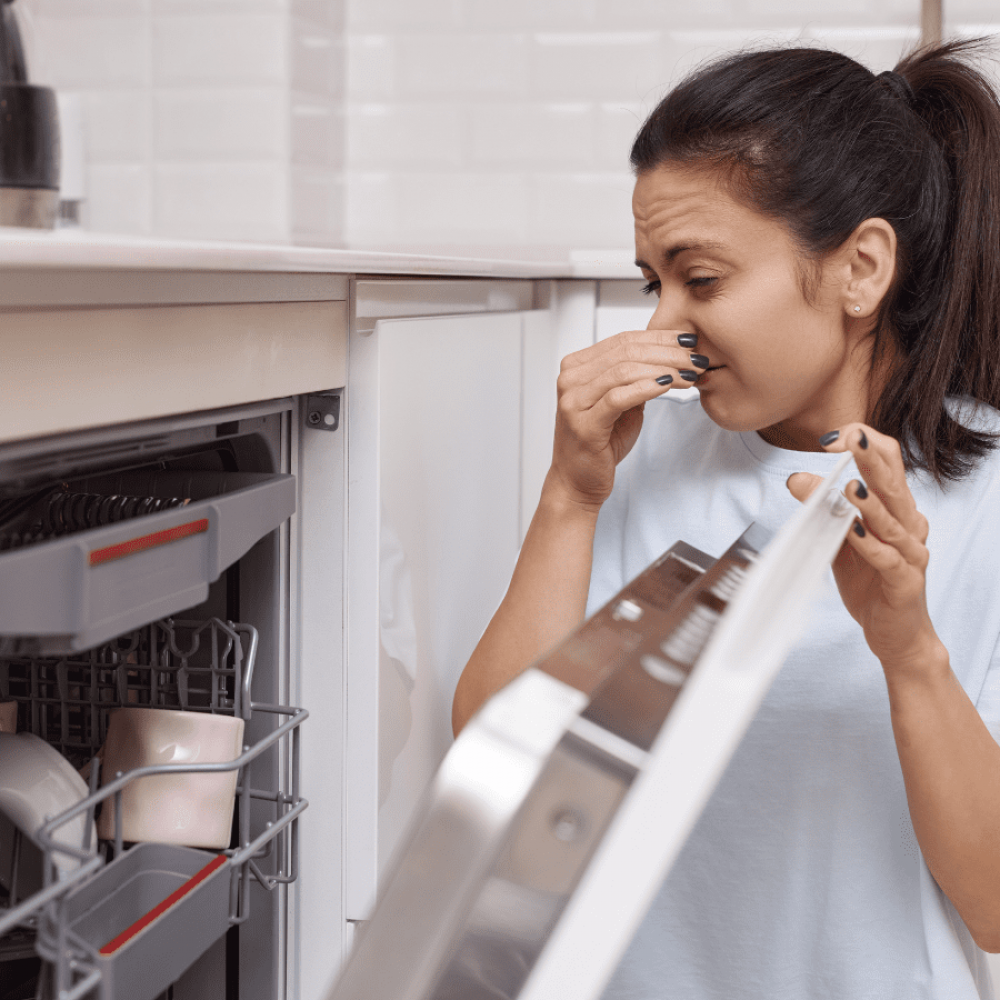
Have you noticed a lingering odor coming from your dishwasher? Don’t worry; we’ve got you covered with effective solutions for a smelly dishwasher. From identifying the source of the problem to using natural remedies like baking soda and white vinegar, we’ll walk you through simple tips to banish those unpleasant smells. By understanding your dishwasher’s needs and implementing preventative measures, you can keep your appliance fresh and odor-free. Let’s dive into practical ways to tackle smelly dishwasher issues head-on.
Effective Solutions for a Smelly Dishwasher
A smelly dishwasher can be a nuisance, but there are effective solutions to eliminate those unpleasant odors. By following these simple steps, you can restore your dishwasher to its pristine condition and enjoy the fresh, clean scent every time you open the door.
before you begin cleaning your dishwasher, be sure to locate your manual for instructions for your specific machine. Manualslib is a great resource for locating your manual online.
1. Identify the Source of the Odor
The first step in eliminating a smelly dishwasher is to identify the source of the odor. Often, the culprit is food waste that has accumulated over time. Excess food particles can get trapped in the filter, crevices, and interior walls of the dishwasher, leading to unpleasant smells. Take a closer look at the interior of your dishwasher and inspect the filter for any signs of food residue. Finding your dishwasher’s manual will help you identify where the filters are located and the best way to remove and clean them. If you notice any build-up, it’s time for a thorough cleaning. By removing these food waste deposits, you can eliminate the source of the odor and prevent it from recurring in the future.
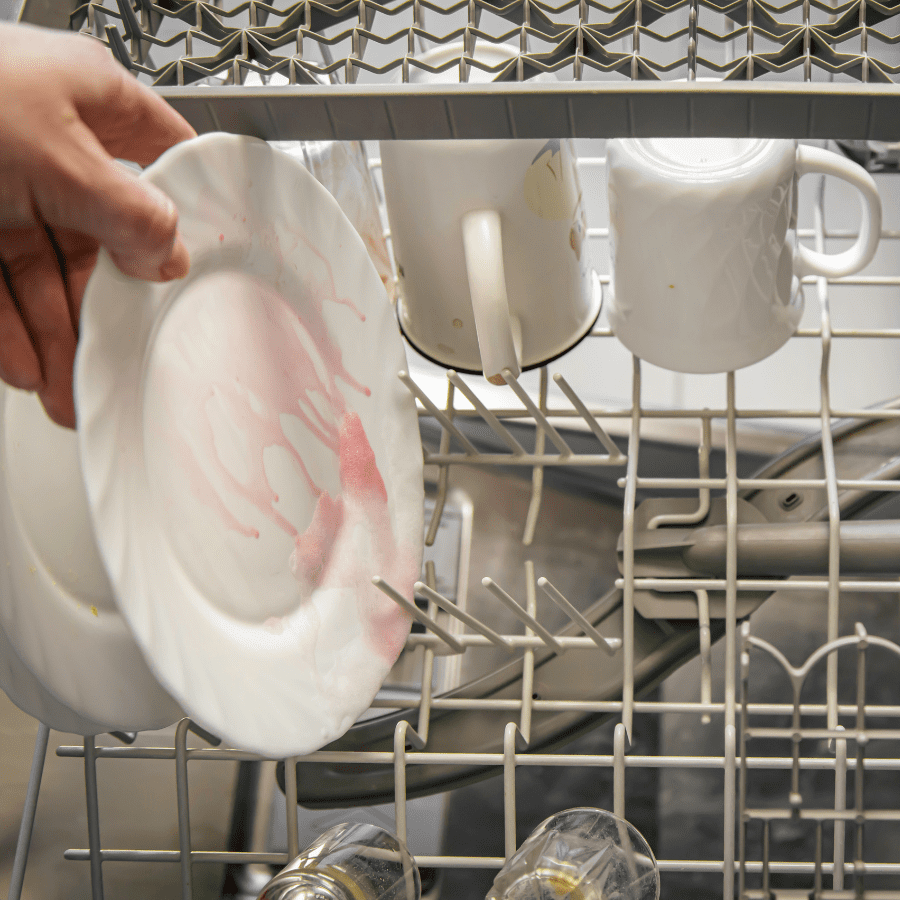
2. Clean the Filter Thoroughly
One of the primary causes of a smelly dishwasher is a clogged or dirty filter. The filter plays a crucial role in trapping food particles and preventing them from clogging the drain. Over time, the filter can become clogged with debris, leading to unpleasant odors. To clean the filter, consult your manual for location and removal. Twist it counterclockwise to remove it and wash it thoroughly with hot soapy water. Use a bottle brush to scrub any stubborn residue. Once clean, reinsert the filter. Regularly cleaning the filter will help prevent odor-causing particles from accumulating and keep your dishwasher smelling fresh.
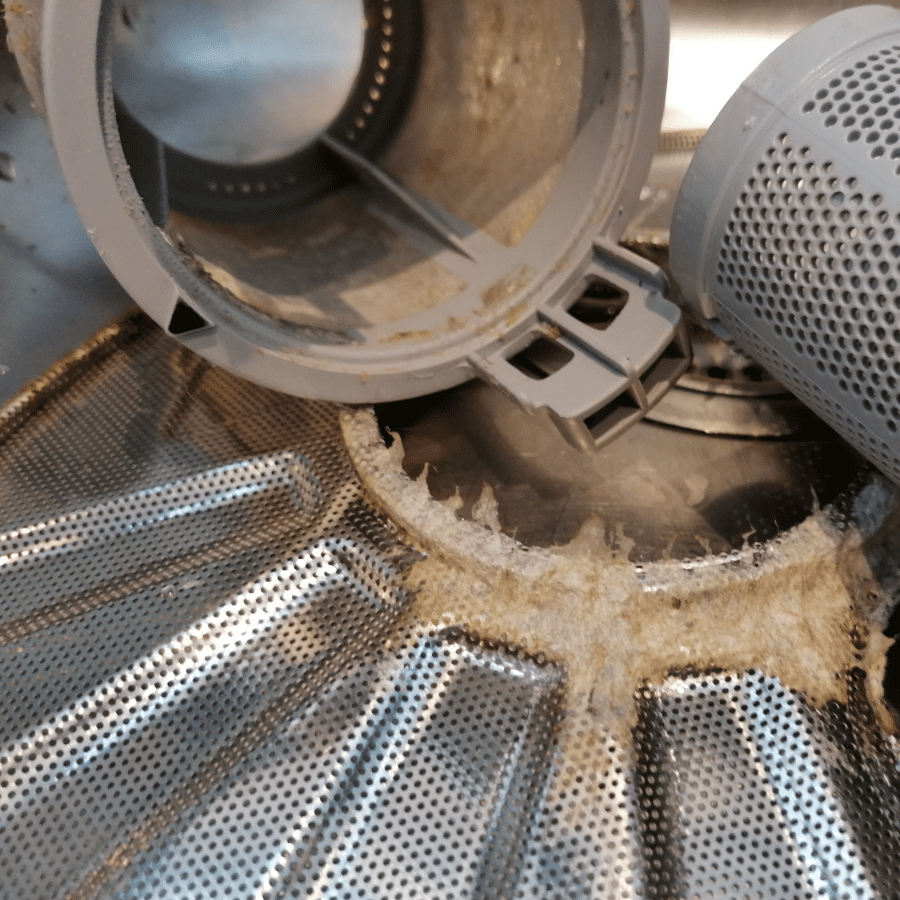
3. Use Vinegar and Baking Soda Rinse
Vinegar and baking soda are natural cleaning agents that can effectively eliminate odors in your dishwasher. To use this method, start by placing a cup of white vinegar in the top rack of your dishwasher. Run a hot water cycle without any dishes. The vinegar will help break down any food particles and eliminate odor-causing bacteria. After the vinegar rinse, sprinkle a cup of baking soda on the bottom of the dishwasher and run another hot water cycle. Baking soda will neutralize any remaining odors, leaving your dishwasher smelling fresh and clean. This simple and natural solution is an effective way to eliminate stubborn odors in your dishwasher.
4. Freshen with Lemon
Lemons are known for their natural cleaning properties and refreshing scent. To freshen your dishwasher, simply cut a lemon in half and place it in the top rack of your dishwasher. Run a hot water cycle without any dishes. The citric acid in the lemon will help remove odors and leave your dishwasher smelling fresh. Alternatively, you can squeeze the juice of a lemon into a bowl and place it on the bottom rack of your dishwasher. The heat from the dishwasher will release the lemon’s aroma, providing a natural and pleasant scent. This eco-friendly method is an excellent way to freshen your dishwasher and eliminate any lingering odors.
5. Check and Clean the Drain Hose
The drain hose is responsible for carrying away the wastewater from your dishwasher. Over time, it can become clogged with food particles, grease, or debris, leading to unpleasant odors. To check the drain hose, start by disconnecting it from the dishwasher or the sink. Inspect it for any signs of clogs or blockages. If you notice any debris, use a brush or a pipe cleaner to remove it. Once the drain hose is clear, reconnect it and run a hot water cycle to flush out any remaining residue. Regularly checking and cleaning the drain hose will help prevent odor-causing clogs and ensure proper drainage in your dishwasher.
6. Regular Maintenance Tips
In addition to the above solutions, implementing regular maintenance tips can help prevent smelly dishwasher odors. Here are some maintenance tips to keep your dishwasher clean and fresh:

- Follow a routine cleaning schedule: Set a regular cleaning schedule for your dishwasher, including a thorough cleaning every few months.
- Practice proper loading techniques: Properly load your dishwasher, ensuring that there is enough space between dishes for water and detergent to circulate.
- Use the right detergent: Choose a dishwasher detergent that is specifically designed for your dishwasher and the type of water in your area.
- Leave the door ajar between uses: After each use, leave the dishwasher door slightly open to allow moisture to evaporate and prevent the growth of mold and mildew.
- Inspect and clean the spray arm: Periodically check the spray arm for any clogs or blockages and clean it to ensure proper water distribution.
By following these regular maintenance tips, you can keep your dishwasher in optimal condition and prevent the buildup of odor-causing particles.
Preventing Future Dishwasher Odors
1. Routine Cleaning Schedule
Establishing a routine cleaning schedule is crucial to prevent future dishwasher odors. Set a regular cleaning schedule for your dishwasher, including a deep cleaning every few months. This will help remove any built-up residue and keep your dishwasher smelling fresh. Additionally, run a hot water cycle with a dishwasher cleaner once a month to dissolve any remaining food particles and grease. A routine cleaning schedule will ensure that your dishwasher remains odor-free and in optimal condition.
2. Proper Loading Practices
Proper loading practices are essential to prevent food particles from accumulating in your dishwasher and causing odors. When loading your dishwasher, ensure that there is enough space between dishes for water and detergent to circulate. Place larger items, such as pots and pans, on the bottom rack, and smaller items, such as glasses and utensils, on the top rack. This will allow for proper water distribution and prevent food particles from getting trapped in hard-to-reach areas. By following proper loading practices, you can minimize the risk of odors and ensure that your dishes come out clean and fresh.

3. Using the Right Detergent
Using the right detergent is crucial to prevent lingering odors in your dishwasher. Choose a dishwasher detergent that is specifically designed for your dishwasher and the type of water in your area. Some detergents are formulated to eliminate odor-causing bacteria and dissolve food particles effectively. Follow the manufacturer’s instructions for the recommended amount of detergent and run a complete wash cycle. Regularly using the right detergent will ensure that your dishes are clean and odor-free, eliminating the need for additional cleaning measures.
4. Leave the Door Ajar Between Uses
Leaving the dishwasher door slightly ajar between uses can help prevent the growth of mold and mildew. Moisture can accumulate in a closed dishwasher, providing an ideal environment for mold and mildew to thrive. By leaving the door slightly open, you allow air to circulate and moisture to evaporate, preventing the growth of odor-causing bacteria. Remember to close the door completely when the dishwasher is not in use to avoid any accidents. This simple habit can significantly reduce the risk of future dishwasher odors and maintain a fresh and clean environment.
Understanding Your Dishwasher’s Needs
Understanding your dishwasher’s needs is essential to ensure its optimal performance and prevent future odors. By familiarizing yourself with your dishwasher’s manufacturer’s guide and following proper maintenance practices, you can keep your dishwasher in top shape. Additionally, being aware of signs of malfunction, such as unusual noises or leaks, can help you address any issues promptly. If you’re unsure about any aspect of your dishwasher’s maintenance or performance, it is recommended to seek professional maintenance services to avoid further damage and ensure its longevity.
1. Consult the Manufacturer’s Guide
The manufacturer’s guide provided with your dishwasher contains valuable information about its maintenance and care. It outlines specific instructions for cleaning, troubleshooting common issues, and ensuring optimal performance. Take the time to read the guide thoroughly and familiarize yourself with your dishwasher’s specific requirements. By following the recommendations outlined in the manufacturer’s guide, you can prevent future odors and keep your dishwasher functioning at its best.
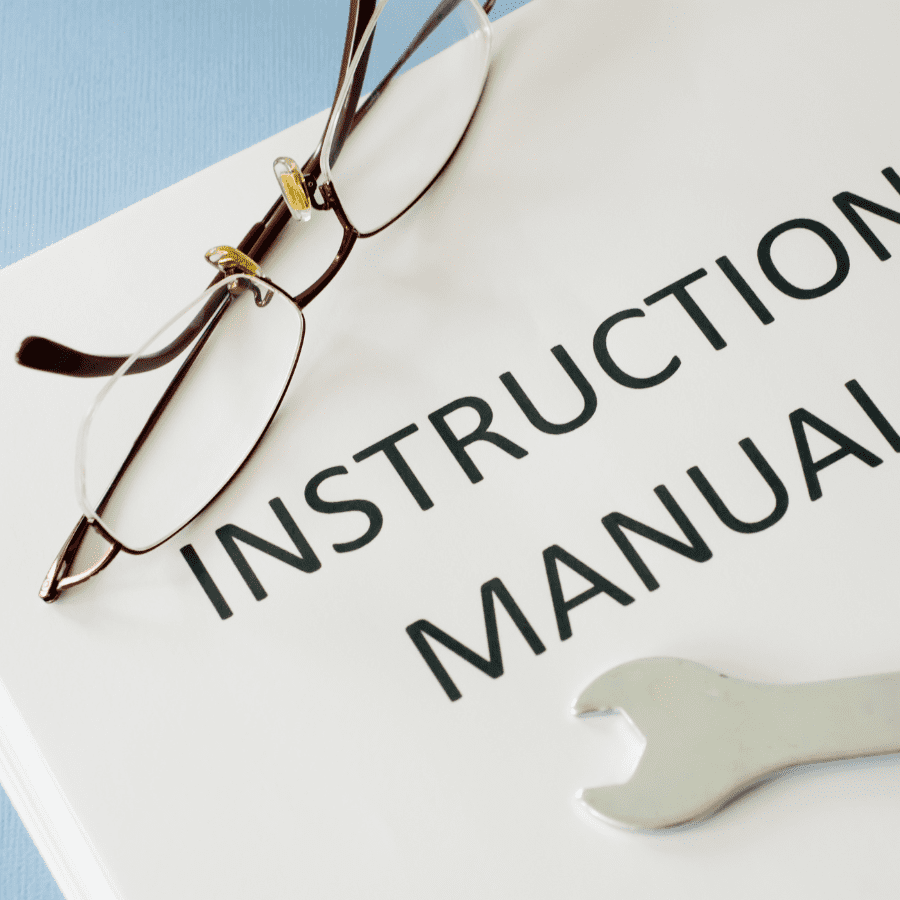
2. Recognize Signs of Malfunction
Recognizing signs of malfunction in your dishwasher is crucial for addressing issues before they worsen. Unusual noises, leaks, or prolonged cycles can indicate a problem with the appliance. If you notice any of these signs, it is recommended to seek professional maintenance or service. Attempting to fix the issue yourself may result in further damage or voiding any warranties. Professional technicians have the expertise to diagnose and resolve dishwasher malfunctions, ensuring its optimal performance and preventing future odors.
3. Importance of Professional Maintenance
Professional maintenance is essential for the longevity and optimal performance of your dishwasher. Regular maintenance visits by qualified technicians can help identify potential issues, clean hard-to-reach areas, and ensure that all components are functioning correctly. They have the expertise and tools to address any problems and prevent future odors. Additionally, professional maintenance services often include thorough cleaning of the dishwasher’s interior, filter, and drain hose, eliminating any buildup that may cause odors. By investing in professional maintenance, you can keep your dishwasher in excellent condition and enjoy a fresh and odor-free kitchen.
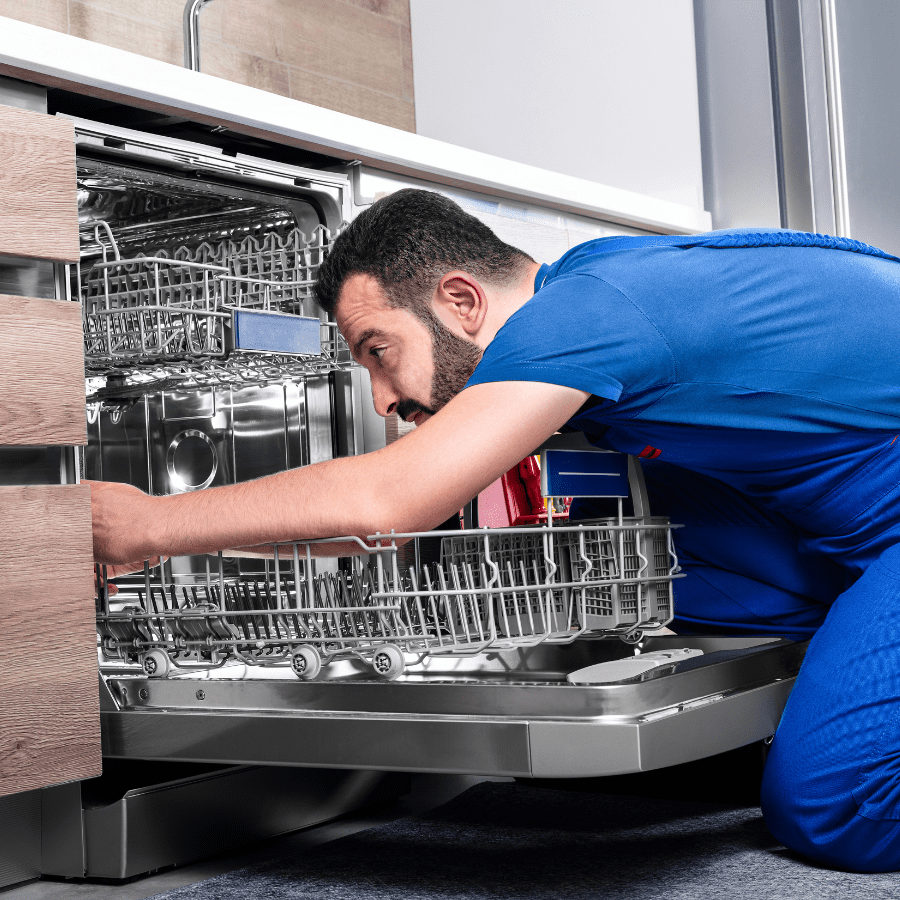
Conclusion
If you’ve been battling with a smelly dishwasher, fear not! By identifying the odor source, using natural solutions like vinegar and baking soda, and maintaining your dishwasher regularly, you can bid farewell to those unpleasant smells. Remember, proper loading practices, routine cleaning, and leaving the door ajar can prevent future odors. Understanding your dishwasher’s needs is key to keeping it fresh and odor-free. For more tips and tricks, consult your manufacturer’s guide and be proactive in recognizing signs of malfunction. With these effective solutions and preventive measures, your dishwasher will always smell fresh and clean.
For extra help keeping up with your home and your dirty dishes, contact Better Life Maids for a free quote today!
Frequently Asked Questions
How often should I clean my dishwasher filter?
To prevent odor-causing buildup, it is recommended to clean your dishwasher filter every two to three months. Regular cleaning of the filter is an essential part of routine dishwasher maintenance and ensures optimal performance. Make it a part of your regular cleaning chores to keep your dishwasher in top shape.
Can I use bleach to clean my dishwasher?
It is not recommended to use bleach to clean your dishwasher. Bleach is highly corrosive and can damage the dishwasher’s internal components, such as the stainless steel tub. Instead, opt for natural cleaning methods, such as vinegar and baking soda, to eliminate odors and keep your dishwasher in excellent condition.
What should I do if there’s standing water in my dishwasher?
If you notice standing water in your dishwasher, it may indicate a clog in the drain or a malfunctioning pump. First, check for any visible debris or food particles in the drain. If the clog persists, it is recommended to call a professional to inspect and resolve the issue.
How can I remove stubborn odors if vinegar and baking soda don’t work?
If vinegar and baking soda don’t effectively remove stubborn odors from your dishwasher, you can try using a specialized dishwasher cleaning product. These products are designed to tackle tough odors and residues. Follow the manufacturer’s instructions for the best results.
Is it safe to run a dishwasher empty as a cleaning method?
Yes, running the dishwasher empty as a cleaning method is safe and recommended. It allows hot water and detergent to circulate throughout the dishwasher, removing any buildup and eliminating odors. Use a dishwasher cleaner or a cup of white vinegar to enhance the cleaning process.
What are the signs that my dishwasher needs professional servicing?
Signs that your dishwasher may require professional servicing include unusual noises, leaks, prolonged cycles, or a decline in cleaning performance. If you notice any of these signs, it is recommended to call a professional technician to diagnose and resolve the issue.
Can certain foods cause more odors than others in a dishwasher?
Yes, certain foods can cause more odors than others in a dishwasher. Foods high in grease or strong spices can leave behind residue and contribute to unpleasant odors. It is best to scrape off excess food before loading the dishwasher to prevent odor-causing buildup.